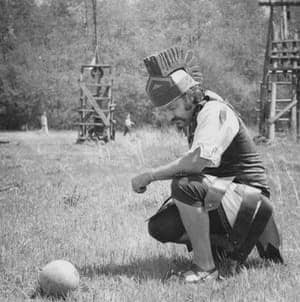How on earth could a timer that looks like a tomato, Jesus Christ, and the fictional southpaw boxer from Philadelphia named Rocky Balboa find their way into the same blog post? A recent professional development session at my school had me pondering this very thing.
The Pomodoro Technique
The Pomodoro Technique is a
strategy for time management that has been around since the 1980s. The basic idea is that you set a timer, which may or may not be in the shape of a
pomodoro (Italian for "tomato"), work on your task for that amount of time, take a break, and then set the timer again for your next task.
This is a great strategy and one that the learning coach at our school, Jeff Buckner, presented to us during one of our faculty Teaching & Learning sessions. Many of our students struggle with time management, and this is an easy strategy for them to implement. Of course, this isn't just for students, and as I began thinking about how this could play out in my own life, my thoughts turned to Jesus and Rocky Balboa.
Our Favorite Characters
"A plain sailor man took a notion to study Latin, and his teacher tried him with Virgil; after many leassons he asked him something about the hero.
"Said the sailor: 'What hero?'
"Said the teacher: 'What hero, why, Aeneas, the hero.'
This anecdote well expresses the reaction many people have had to the characters of Achilles in the Iliad and Aeneas in the Aeneid. If you prefer your heroes to be sword-wielding, spear-throwing warriors, the kind that yell out that their commander is a "bloated drunk with a dog's eyes and a rabbit's heart" and fight a river...yes, a river...then Achilles is your guy. If, on the other hand, you want your hero to be the kind of person who suppresses his own feelings of pain as he inspires his troops and will do whatever it takes to fulfill his duty to gods, country, and family, then you want Aeneas.
For years, I was an Achilles kind of guy, and for that reason I did not enjoy all that much teaching Vergil's Aeneid. At some point that changed, but I still gravitate to characters that leave it all out on the field, even if doing so does not lead to victory. In addition to Achilles, I absolute love Diomedes in Book 5 of the Iliad.
Thus toiled the chiefs, in different parts engaged,
In every quarter fierce Tydides raged,
Amid the Greek, amid the Trojan train,
Rapt through the ranks, he thunders o'er the plain;
Now here, now there, he darts from place to place,
Pours on the rear, or lightens in their face.
Thus from high hills the torrents swift and strong
Deluge whole fields, and sweep the trees along;
Through ruined moles the rushing wave resounds,
O'erwhelms the bridge, and bursts the lofty bounds;
The yellow harvests of the ripened year,
And flatted vineyards, one sad waste appear,
While Jove descends in sluicy sheets of rain,
And all the labours of mankind are vain.
So raged Tydides, boundless in his ire,
Drove armies back, and made all Troy retire. (Iliad 5.110-125, Alexander Pope translation)
I love Rocky Balboa, giving it all, even when he loses to Apollo Creed in the first movie, and my favorite opponent of his is probably Clubber Lang, whose grit and determination, even though he loses, are simply brutal. Yet I sometimes wonder. Are these the models that should inspire me the most?
Front-running
 |
| Prefontaine and Bowerman |
In the 1998 film
Without Limits, University of Oregon track coach
Bill Bowerman (Donald Sutherland) is having a planning session with long-distance phenom
Steve Prefontaine (Billy Crudup), who does not agree with his coach's philosophy of running. After stating flatly that running any other way than all out and leading for the entire race is little more than the excrement of chickens, Pre explains.
Pre: What else do you call laying back for two and a half miles then stealing a race in the last two hundred yards?
Bowerman: Winning!
There is a great part of me that thinks as Steve Prefontaine did. I am a highly driven person, and like Achilles or Diomedes or Rocky or Pre, I want to hit hard and give it my all. And then there's Jesus.
Pomodoro Paul?
Jesus took time away from the demands of ministry to pray. He got up early and separated Himself from the hustle and bustle of life to spend time with His Father. He was never in a hurry and even stopped to address the needs of an unknown woman who had suffered from bleeding for twelve years while on His way to heal the son of the synagogue leader. He famously taught His friend Martha not to be stressed out over things of lesser importance and to focus on what truly mattered. And despite His seemingly slow and deliberate pace, He accomplished all He was sent to do.
What, then, is my takeaway from the Teaching and Learning session at our school? I know myself well enough to acknowledge that I am wired for action. I will probably still declare those lines about Diomedes translated by Pope when I am in my golden years and with as much thrill and excitement as I read them today. Yet I want to reach that time and fulfill all that God has called me to do, and therefore it's not so much the action-adventure heroes that are my models for how to live, however much I may enjoy reading and watching their exploits, but Paul. Paul was a hard-driven sort of person, shown first in his zeal for his faith searching out Christians to have them punished. Yet once his life was transformed by his encounter with Jesus on the road to Damascus, he approached life a bit differently. Still passionate, although for a different mission, he would say go on to say, "I press on toward the goal for the prize of the upward call of God in Christ Jesus." (Philippians 3:14, ESV)
Passion and drive are good, but they must be balanced with rest and restoration. Fulfilling the call of God is more important than the thrill of any high adventure moment along the way. I imagine that if tomato-shaped timers had existed in his day, Paul might have found value in the Pomodoro Technique.








